Civil Liberties, Guantanamo, Human Rights, Iraq War, Targeting Muslims, Torture, Truth to Power
Podcast: Play in new window | Download
Updates:
—-
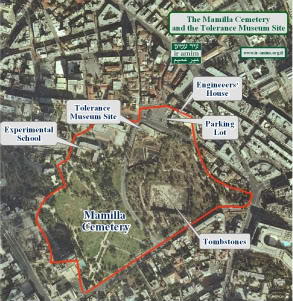

Simon Wiesanthal Museum of Intolerance: Mamilla Cemetery In Jerusalem
Critics continue to speak out against plans to build the new Simon Wiesanthal Museum of Tolerance near the Mamilla Cemetery. The cemetery is an 800 year old Muslim burial in the heart of Jerusalem and covers about 12 percent of the plot of the new 250 million dollar museum. Today we examine the ongoing legal fights to preserve the cemetery. Mamillacampaign.org
The museum construction has been halted several times in the last few years. Recently, the Israel’s Supreme Court ruled to go ahead with the continued construction, since there was no objection in 1960 when a parking lot was built over a small part of the cemetery. Controversy swirls around the project, the previous architect of the museum project designed an imposing futuristic mix of titanium, glass and stone. Police detain filmmakers
The initial outcry opposing the project came from the Palestinian community, Israeli archaeologists and Ultra-Orthodox Jews. Meanwhile, construction of the museum continues in portions of the area where human remains have not been found. CCR Synopsis
Dima Khalidi:
- Mamilla Cemetery is a huge piece of land located in West Jerusalem It’s an ancient cemetery dating back possibly to the 7th century. Palestinians buried their relatives there since at least 1948
- It has the ancestors of the biggest Jerusalem families including my own family.
- The cemetery has been constantly built on since the fifties and sixties. Our petition to several United Nation bodies is really part of a larger opposition. UN rapporteur on Freedom and Belief and the rapporteur on Ending Racial Discrimination
- We are asking that they label the Mamilla cemetery as a historic site and protect it and move this project, also find the remains that have been dug up so that the Palestinian families can re-bury them. 250 sets of bones removed, at least.
- There are four layers of burials dating back to the 11th century. 2 thousand people buried there.
- The museum’s archeologist called it an archeological crime. The mayor of Jerusalem offered a different site.
- Michael Ratner: what’s going on here is the expulsion of the memory and history of Musliims and Palestinians from Jerusalem
- Israeli Supreme Court handed down a decision in December 2009 affirming previous decision that it was legal to build this museum on top of the cemetery.
Guest – Palestinian-American lawyer Dima Khalidi. Dima is based in Chicago, she has a JD from DePaul University College of Law in Chicago and a Masters from the School of Oriental and African Studies, University of London in International and Comparative Law with a focus on Islamic Law. She has worked with the People’s Law Office in Chicago, and the Center for Constitutional Rights (CCR) in New York. Prior to studying law, she spent two years working in the West Bank at Birzeit University on a project studying the role of customary/tribal law in Palestinian society. She has been working on the Mamilla cemetery case with CCR and other attorneys in recent months.
——-
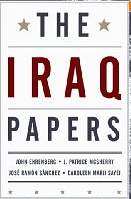

The Iraq Papers: John Ehrenberg
Political science professor and author John Ehrenberg joined hosts live in the studio to talk about a book he had worked on with 4 other colleagues titled The Iraq Papers. (From the review) The book offers a compelling documentary narrative and interpretation of this momentous conflict. With keen editing and incisive commentary, the book weaves together original documents that range from presidential addresses to redacted memos, carrying us from the ideology behind the invasion to negotiations for withdrawal. These papers trace the rise of the neoconservatives and reveal the role of strategic thinking about oil supplies.
The authors also provide Congressional resolutions and speeches by President Bush, but internal security papers, Pentagon planning documents, the report of the Future of Iraq Project, and eloquent opposition statements by Senator Robert Byrd, other world governments, the Non-Aligned Movement, and the World Council of Churches.
John Ehrenberg:
- The book is a compendium of presidential speeches, position papers, news conferences.
- All the way from those who planned it beginning in the late 1990s to those who fought it in Iraq,
- This is not a neutral book, this is a reader with an attitude. It’s an anti-war reader. We try to be fair, and try to represent the many voices in the Iraq war. The lead up to the war so marked by misinformation, duplicity, lies, silence, everybody’s hands are dirty on this.
- As we debated, we really came to the one single variable that could be used to describe this war.
- with the fall of the Soviet Union is the late 80s, there arose in Washington a group of insiders who thought with considerable evidence that the world had passed from a bipolar system to a unipolar system, these groups became consolidated into groups one of which became PNAC (Project for the New American Century)
- Their view was that history had presented the US with a unique moment to cement its hegemony over the entire world. It’s really as simple and scary as that.
- Why care about it now? A lot of reasons. To what extent did unilateralism and pre-emption simply mirror the longstanding trends in American foreign policy? We split the middle and decided both were true.
- The people who signed PNAC go into the state department of the Bush Administration.
- The neo-conservatives haven’t disappeared. Every couple weeks, Dick Cheney gets on the air to attack Obama. Sara Palin.
- The architecture of the Iraq war, the reasons for it are still alive and kicking. There’s a very good piece in the NY Times that Gary Wills wrote. He says it doesn’t matter how reformist he/she is that comes into power, confronts the “deep state”
- They are deep beneath the surface and are immune to democratic power and they are not touched by elections or anything else. Coming into power (Obama) is confronted en mass by secret treaties, foreign obligations, military entanglements, hundreds of bases, hundreds of countries.
- Assuming he was honest, he would be unable to disentangle from that apparatus. I think Afghanistan is a way to protect Obama from the right on charges of abandoning Iraq. I don’t think Obama’s people are under any illusions to think that they can do what others couldn’t in recorded history.
- This is a holding operation to provide them with cover. We have a document called the Kubark, its a CIA manual (read manual) that became declassified a few years ago, that basically outlines all of the torture techniques.
- The basic orientation of the Bush foreign policy was organized around what we call pre-emption.
- These guys were clear in their intention, and the astounding thing is they announced their intention years before.
- None of this should have come as a shock to people. The claim was power trumps everything.
- You can’t solve political issues militarily, and that’s what the neo-cons were convinced they could do.
Guest – John Ehrenberg, author of Servants of Wealth, The Rights Assault on Economic Justice, and recently, The Iraq Papers. He’s also professor of political science at Long Island University.
Censorship, Civil Liberties, Criminalizing Dissent, Gaza, Guantanamo, Habeas Corpus, Human Rights, Military Tribunal, Prison Industry, Targeting Muslims, Torture, Truth to Power
Podcast: Play in new window | Download
Updates:
—

Historic International Support: Gaza Freedom March Debrief
Hundreds of activists with the Gaza Freedom Marchers have returned from Israel, Palestine and Egypt bringing home incredible stories from the largest international mobilization of people in solidarity. We hear first hand accounts from our own Michael Ratner who with his family were among the 13 hundred solidarity marchers. We are also joined by Felice Gelman who has also returned from the Gaza Freedom March. As many listeners may know, the Egyptian authorities refused to allow the 1,365 participants from 43 countries to enter the Gaza Strip, but later 100 people were let in to Gaza.
Felice Gelman / Michael Ratner:
- It was a remarkable event despite not getting into Gaza. 1400 people from 43 countries, Europe India, Australia, South Africa. Within 3 days the Egyptian government went from we need more info, we’re working with you to . . . you’re not coming.
- We were unable to get a meeting place at any time for any group of people. The Egyptians said that any gathering of more than six people would be illegal. One of the prerequisites in order to get into Gaza is you don’t engage with local opposition in Egypt. In a way it was a perfect demonstration of what the siege in Gaza is all about.
- Egypt is a police state. There are 2 million police for a population of 60 million.
- Egyptian police are very brutal with their people. They’re disappeared, they’re tortured. No room for democracy. No support for a civil society to express itself to protest.
- The thing that was incredible was the number of Egyptians that wanted to join us. There were a couple of instances where people were hurt. The secret police would try to single people out at a demonstration and punch or hit them.
- They would identify women who were Muslims. I don’t know if was that they were Egyptian and they (secret police) thought they could get away with it. They beat up a 12 year old girl and a 75 year old woman, they were not discriminating.
- Egyptians (opposition) joined in with GFM demonstrations in Cairo.
- We had a demonstration at the US Embassy in Cairo, the police surrounded them for five hours before they could get into Embassy. The US Embassy didn’t seem to think that this was bizarre until they were reminded of their legal obligation to help their citizens.
- the US Embassy informed the Egyptian police that they had no objection of us going to Gaza.
- There were some people who went to Al-Arish, and the Egyptian police were onto that. They surrounded a hotel in Al-Arish
- (Michael Ratner) I can’t imagine the logistics and the organizing nightmare it was for you guys
- I can’t think of a time since the Spanish Civil War, that there was a contingent of such size and national breadth that traveled to assist people in their distress from a brutal attack.
- I think this was an incredible demonstration of where the world stands on Gaza.
- My kids 19 and 21, seeing people with the courage to go to these demonstrations from all over the world. Out of that I think there will be a global organizing structure.
- The other thing is the drafting of the Cairo Declaration, drafted by the South African delegation. Calling on the ending of the occupations of Gaza and the West Bank, primarily with global BDS movements. (Palestinian unified call)
- When Gaza was getting attacked, it was the South African trade unionists that refused to load the weapons that were being sent to Israel.
- The potential for labor to move on this is enormous and powerful.
- The Gaza Freedom March website will be handed over to the committee working on the Cairo Declaration.
- New York Report Back – Judson Memorial Church January 21 / 55 Washington Square S.
Guest: Felice Gelman, member of the Wespac Middle East Committee and a member of the Steering Committee that organized The Gaza Freedom March. She has traveled to Gaza twice since the Israeli invasion last year.
—————–

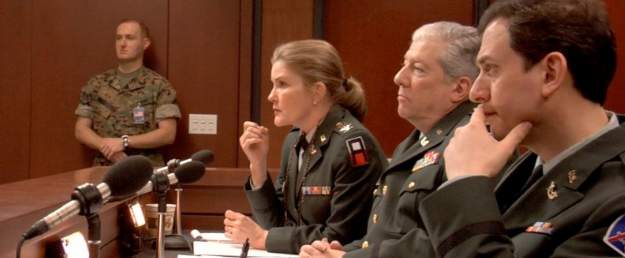
The Response: Sig Libowitz – Combatant Status Review Tribunals
January 11, 2010 marked the 8th anniversary since the Bush administration turned the US Naval Base at Guantanamo Bay, Cuba into a “enemy combatant” detention facility. Essentially re-commissioning the base as a torture chamber and legal black hole, where prisoner suicides are considered acts of war. As we’ve reported on in the last few months, the Obama administration has held on to the power to allow for a preventive detention system that would indefinitely jail terror suspects in the United States without trial. Meanwhile, military tribunals are now mainstream news, the tribunals are called Combatant Status Review Tribunals, where military justices discern who is an enemy combatant. These trials are also the subject of a 30 minute film titled The Response. The film is written and produced by actor Sig Libowitz who is transitioning from being an actor playing an attorney on the TV series Law and Order, to becoming a real lawyer. While in law school, Libowitz was tranfixed by the tribunal process of no jury and no defense lawyer. The film is based on actual court transcripts and is shortlisted for The Academy Award. The Response is screening at Columbia University’s School of Law on January 20th at 6pm.
Sig Libowitz:
- Michael Ratner: First of all there was no real process for people in Guantanamo. Then we won the right to Habeas Corpus, to go into a federal court and challenge their detention. At that point the Bush Administration set up a special process in Guantanamo.
- As we depict in the film, this is a process where the detainees don’t have a lawyer, they are not provided with the evidence that’s against them. The real transcripts told the story of the detainees and the judges in these CSRTs. From that I saw an incredible movie, and incredible opportunity.
- Because, I thought I had an understanding of what Guantanamo was all about, then I read the transcripts (of a CSRT) It gives a human dimension to the detainee and the military judges.
- Screening at Columbia Law School, Wednesday January 20th 6PM All the cast will be there and Shane Kadidal and Matthew Waxman. We’ve screened the movie at the Pentagon.
Guest: Sig Libowitz, an American lawyer, actor, film executive and director. Libowitz is notable for producing, directing and starring in a film, The Response, he wrote after reading some transcripts from Guantanamo captives‘ Combatant Status Review Tribunals. Libowitz is an executive for the acquisitions department of Turner Classic movies. He had a recurring roles in The Sopranos and Law and Order.
——————

Free Fahad Hashmi
Fahad Hashmi a Pakistani born American student, has spent nearly 2 1/2 years in solitary confinement in a Manhattan detention facility. He has been isolated for one of the longest periods in America as a suspect before trial. Hosts reported on this case in March 2008, we spoke with Fahad Hashmi’s father Syed Anwar, and Fahad’s attorney Sean Mayer. Fahad is accused of storing waterproof socks, ponchos and raincoats. The US charges were based on allowing an acquaintance “Janaid Babar” to store this rain gear in the closet of his London flat. Janaid Babar was a paid government cooperator who has been used to testify against Muslims around the world. Nicknamed ‘Supergrass’ by the British media, Babar was used by the UK government to testify against Omar Khyam and several other Muslim men in the so-called Fertilizer Case. Meanwhile Fahad’s trial is expected in January 2010, the prosecution will use Junaid as a main witness. Hashmi has been held under the SAM’s Special Administrative Measures that include a 23 hour a day lockdown, constant video surveillance of his cell and limited visitation.
(Fahad’s Brother)Faisal Hashmi:
- I’m under SAMs as our family is. Our visits with him, we can’t talk about it, but I can say from open court, he looks frail, he looks jittery He’s been in solitary confinement for 2 and half years.
- He’s in the Metropolitan Correctional Center a few blocks from here. Within his own cell, he’s videotaped at all times. He’s not allowed to talk out loud. He has a microphone in his cell.
- This is about deconstructing a human being, depriving him of his humanity. He’s 29 years old.
- Charged with four counts of material support for terrorism. He stored ponchos and rain gear.
- In 2004, this acquaintance while working on his Master’s degree stayed with Fahad.
- This was January 2004, he went to the US in April 2004, was arrested, and became a cooperating witness for the US government. At this time about 8 people got arrested, some in Pakistan, London and Canada, all on Junaid Barbar’s witness cooperation.
- In June 2006, my brother gets arrested. They tell Fahad, that Junaid gave the ponchos and gloves to Al-Qaeda and you gave material support to terrorists. You let Junaid use your cell phone, and Juanaid borrowed 300.00 from Fahad, saying that his ailing daughter needed the money. Fahad’s trial starts January 6, 2010
- FreeFahad.com This case has nothing to do with ponchos and socks.
Jeanne Theoharis:
- This is a case we need to be concerned about for those who value the first amendment. I had Fahad as a student in Brooklyn College in 2002
- There’s no way to understand this case without understanding the way Fahad was being watched many years ago even as a college student. We’ve sent a letter to the attorney general addressing 3 main issues, the conditions of his confinement, the way his due process is being violated and then first amendment issues.
- The letter was signed by more than 550 scholars and writers. Organizing among the Muslim student community.
- Theaters Against War calling attention to Fahad’s case.
- Free Fahad Vigil January 18, 2010
Guests: Fahad’s brother Faisal Hashmi and Jeanne Theoharis, an associate professor of political science at Brooklyn College, City University of New York. She was one of Fahad’s professors and she has been following this case.
———————————————————————
Civil Liberties, Criminalizing Dissent, Guantanamo, Habeas Corpus, Human Rights, Surveillance, Targeting Muslims, Truth to Power
Podcast: Play in new window | Download
Updates:
WBAI Listeners Click Here For Rundown on Tito Gerassi
———–



Lawyer’s You’ll Like: Rhonda Copelon Part II
This is the second part of our Lawyers You’ll Like interview with attorney Rhonda Copelon. She is a professor at the Law School of the City University of New York and director of the school’s International Human Rights Law Clinic. Rhonda is also the Legal Advisor to the Women’s Caucus for Gender Justice. Rhonda shares with us, her history of fighting for the constitutionality of the abortion cases in New York City and its effect on poor women in a pre-Roe v Wade climate. She also discuss the Harlem 6 case. Let’s have a listen.
From Article on New International Criminal Court: “The breadth and specificity of gender crimes in the court’s enabling statutes are directly attributable to a global caucus of women that formed in 1997 in the face of apathy and active resistance to prosecuting gender-based crimes. “Women made a huge difference,” said Rhonda Copeland, a professor at the Law School of the City University of New York and director of the school’s International Human Rights Law Clinic.
“They made it impossible to ignore that women have been left out of justice and that we have to be in it,” Copeland said. “If there were nobody there saying ‘this is violence,’ I don’t know how it would have happened.”Rhonda shares with listeners, her history of fighting for the constitutionality of the abortion cases in New York City and its effect on poor women in a pre-Roe v Wade climate. She also discuss the Harlem 6 case.
Rhonda Copelon:
- Harris v McRae – Rhonda Copelon argued. The case tried to get the federal government to pay for poor women’s abortions. We didn’t go to court to get medicaid for women, we went to court to save it.
- McRae has become a 2 line footnote in text books today and there’s a certain way that people have accepted that medicaid doesn’t have to pay for abortions
- 30 years is enough campaign.
- The more these terrible precedents come down, the more we absorb them as culture instead of viewing them as needing to be reversed.
- Historically, based on race and class, women have been treated differently in terms of their reproductive rights.
- When the original anti-abortion laws started to come in to the United States, it was primarily wanting to be sure that the white population of the US would not be out reproduced by the immigrant population and the way to do that was to cut back on abortion.
- The anti-abortion law, the original purposes was to increase reproduction among the elite and also to get rid of those women lay-healers.
- The original abortion laws were class based. In 20th century, class based eugenics laws, sterilization laws. Buck v Bell / you sterilize those who are socially inappropriate.
- Puerto Rican sterilization program. Before Roe v Wade, you couldn’t get a legal sterilization without the rule of 120.
- Religion twisted this around. The Catholic church in the mid 70s – a pastoral plan for pro-life activities.
- The goal was a human right amendment, which was a complete prohibition on abortion. Affecting poor women dependent on tax payer money.
- There’s a lot of evidence that the church went along with family planning in poor neighborhoods in the 60s because it had a population reduction role.
- When you get to abortion, they put the political / religious ahead of the population goals, and what you get is this mobilization to stop medicaid funding for poor women.
- In 1978, you had a historic coming together of the Catholic church and the Protestant evangelicals on the issue of abortion.
- It’s very important to look at the role of extremist religion in this country. When you look at the mega-churches, the power they’ve had to undo the first amendment, in terms of establishment of religion.
- Hyde amendment: the cutoff of medicaid.
Guest – Attorney Rhonda Copelon, professor at the Law School of the City University of New York and director of the school’s International Human Rights Law Clinic. Rhonda is also the legal adviser to the Women’s Caucus for Gender Justice.
———
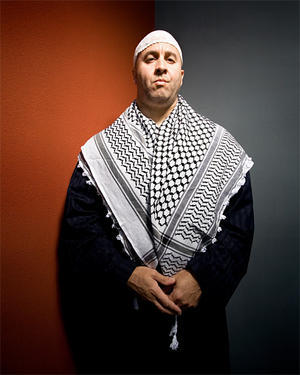
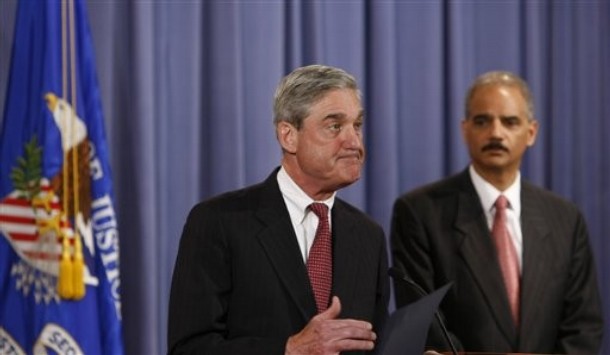
(Encore Interview:) FBI Defends Use of Informants To Spy On Mosques
FBI Director Robert Mueller defended the practice of using informants to monitor mosques in the United States, despite being heavily criticized by attorneys, and Muslim American leaders. Last month a judge ordered the FBI to submit 100 documents detailing the bureau’s surveillance of Muslim leaders in California, which revealed the FBI paid informants to be provocateurs. These cases fit into patterns where paid informants (often a former felon) entice innocent people into a crime, not unlike the Liberty 7 case, the Fort Dix case and the Memorial Day weekend terror plot in upstate New York. In the New York case, Mike German, a former FBI agent of 16 years and now an attorney with the ACLU told Law and Disorder, they “could have wrapped up without making it seem like they’re saving New York City from this terrible destruction.” The media then reports the story which will often prop up the ongoing “War on Terror.”
Shakeel Syed:
- Council of Islamic Organizations sent a letter to Attny Gen. Eric Holder complaining about the FBI infiltration and harassment
- We are baffled at this time, there is a great deal of surplus of rhetoric by the current administration and a deficit at the policy level.
- When Mueller says the FBI will escalate surveillance of mosques and the Obama Administration is silent, that disturbs me.
- This is legal religious bigotry, Mueller is lying in regard to they’re not surveilling the mosques but only the suspected individuals.
- I have stopped using the word provocateur, I shuffle between using the word provocateur and predator.
- Those targeted have pending immigration and naturalization files or converting from H1 visa to resident visa.
- When our community was doing outreach with public officers, I was in the FBI offices during 2003-2005, and I realized then I was being tailgated.
- My phone was tapped on. A few times the phone automatically dialed the local police.
- My hope as a Muslim American is that good American people will stand up in these challenging times.
Guest – Shakeel Syed, Executive Director of the Islamic Shura Council of Southern California.
———————————————————–
Afghanistan War, Civil Liberties, Criminalizing Dissent, Guantanamo, Human Rights, Supreme Court, Surveillance, Targeting Muslims, Truth to Power
Podcast: Play in new window | Download
Updates:
—–
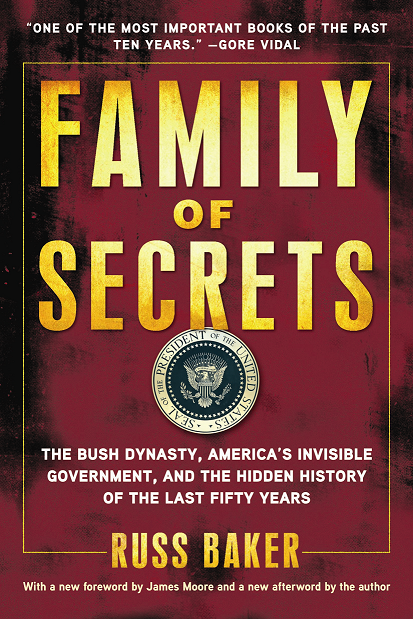

Family of Secrets: The Bush Dynasty, the Powerful Forces That Put It in the White House, and What Their Influence Means for America
From the Kennedy assassination to Watergate to Prescott Bush’s ties to Nazi Germany, the book Family of Secrets: The Bush Dynasty, the Powerful Forces That Put It in the White House, and What Their Influence Means for America, digs into the hidden history of the Bush family. Author Russ Baker takes on the Bush legacy with powerful investigative journalism. One review states that the chapter on George W Bush’s private life is worth the price of the book alone. Baker also reveals George H Walker Bush’s connections with the CIA began in 1953, not when he publicly joined the agency in 1976. Bush’s oil companies were used as fronts for the intelligence agencies around the world with an agenda controlled by power brokers. Award winning investigative reporter Russ Baker also tells us why this insight into the Bush family is important to know now during the Obama administration.
Russ Baker:
- I was training investigative journalists in Yugoslavia 2002, and when I traveled Europe people were asking me what has happened to your country. I knew superficially what happened, but I didn’t know why it happened.
- From the son, I looked into the father,because had the father not been president, the son wouldn’t be president.
- George HW Bush had a secret past more than 20 years, preceding his appointment to the CIA in 1976
- George HW Bush, starts up offshore drilling companies that make no sense, very few customers, very few rigs, but he’s traveling all over the world. It’s perfect intelligence cover.
- They even put a rig in Cuba before the Bay of Pigs, they had Cuban exiles working there
- Ok, he’s working in intelligence, I assume that’s what he’s doing while he was a Congressman, an oil man, an ambassador to the UN. This is fascinating and also deeply troubling.
- I think what we’re looking at is a permanent construct of power.
- Journalists: I don’t think they’ll say so publicly but privately they’ll tell you how scared they are, whether for their personal safety or they don’t want to lose their job.
- The Bush dynasty was the ultimate triumph of the military industrial complex that Dwight Eisenhower, a formal general had warned us about.
- Harry Truman speech on the CIA: I signed the Act that created the CIA, but they never told me the kinda things that they got in to.
- The Bush Family: You see them as the ultimate operatives on behalf of the coalition of powerful Wall St. interests, military contractors, resource extraction mining interests, going all over the world to bring back the plunder essentially.
- They (Bush family) are the representatives, they are not the bosses.
- Obama: It’s very difficult to go against these interests. Our economy runs on war, it’s very difficult to undo that.
- I, myself was naive, and I covered politics for more than 20 years, and I never understood the extent at which democracy is subverted.
- Power in America resides in pool of people about whom we’ve never even heard, the only way you find out is if you look at these Fortune 1000 lists. This is not a conspiracy, it’s just the way things work.
- Michael Smith: When I was starting out and learning how this country works, I was reading C.Wright Mills, Ferdinand Lunberg.
- Guest host Jim Lafferty: This is a matter of commonality of interests that run this country
- Whowhatwhy.com – specialized in doing deep politics investigation – historic epics that haven’t been properly explored.
- Everybody hated Kennedy except the people.
Guest – Russ Baker is an award-winning investigative reporter with a track record for making sense of complex and little understood matters. He has written for the New Yorker, Vanity Fair, the Nation, the New York Times, the Washington Post, the Village Voice and Esquire. He has also served as a contributing editor to the Columbia Journalism Review. Baker received a 2005 Deadline Club award for his exclusive reporting on George W. Bush’s military record. He is the founder of WhoWhatWhy/the Real News Project, a nonpartisan, nonprofit investigative news organization, operating at whowhatwhy.com.
——————–

MondoWeiss: The War of Ideas In the Middle East
Did the recent bombing of Gaza and killing of 1400 Palestinians create a breakdown in the traditional Jewish American support for Israel? In the first of its kind, last month’s J Street Conference brought together 1500 people to the meeting aimed at ending the Arab-Israeli and Israeli-Palestinian conflicts peacefully and diplomatically. The conference is a political arm of the pro-Israel pro peace movement that also lobbied more than 100 members of Congress to press forward with the peace process and two state solution.
Meanwhile the Boycott Divest and Sanction movement gains momentum and Code Pink activists continue to protest, demonstrate in and around Gaza. As many listeners may know living conditions in the Gaza Strip has deteriorated. Salt water has contaminated a large percentage of drinking water and is damaging the kidneys of Palestinian children.
Philip Weiss:
- J Street is the alternative Israel lobby or alternative Jewish lobby because they identify themselves as a Jewish organization.
- They are taking on AIPAC, which has traditionally taken on the role to shape the US response to Israel.
- It was landmark moment in changing the original purpose of the Israel lobby to speak with one voice
- Here’s a lobby that says. . guess what? Jews are not going to speak with one voice, we’re going to have a lot of different voices that contend on this issue.
- Finally there’s a little bit of fragmenting of this reactionary force of AIPAC and the Israel lobby.
- 160 Congressmen were at the J Street Conference in Washington DC. You saw lefty-Jews with a spring in their step. The conference disappointed me in a number of ways, it only had Zionists, progressive Zionists. It condemned the Goldstone Report
- There were some bright lights at this conference. It’s not that different from AIPAC in a number of ways.
- There was a strong sense if you were to speak there (J Street Conf.) you had to be a Zionist.
- Zionist: I think it is support for a Jewish state. We need a Jewish state because we could be persecuted again and we need to go somewhere.
- Generally the rank and file of these people are old Jewish leftys. J Street represents a break in the heresy. The heresy is that we speak with one voice. This process of colonization continues in the West Bank, unabated basically.
- One state with an apartheid system and that’s going to be the struggle. I think if you scratch any Jew in this country he has some connection to Israel. For me it was the 9/11 thing. As they say.
- My brother said, I demonstrated against the Vietnam War, as I did, but my Jewish newspaper says the Iraq War could be good for Israel.
- I couldn’t avoid the issue anymore then when I confronted the issue I became this Palestinian Solidarity person.
- The desperation is heightened by the fact there’s so little recognition of that in the United States.
- Goldstone, a Jewish Jurist from South Africa who fought apartheid and Bosnian war crimes, that he could say. . look this is persecution . . and that can be so ignored, defied and stomped on in the United States. .it’s a horror.
- Our country can affect the situation ( In Gaza / West Bank)
Guest – Peter Weiss, longtime journalist and regular contributor to the Nation and a fellow at the Nation Institute Philip is the author of two books a political novel, Cock-A-Doodle-Doo, and American Taboo, an investigative account of a 1976 murder in the Peace Corps in the Kingdom of Tonga. His website is called Mondoweiss, it explores Middle East policy and Israel/Palestine issues. Philip attended the J Street Conference 2 months ago.
————————————————————–
Civil Liberties, Criminalizing Dissent, Extraordinary Rendition, Guantanamo, Habeas Corpus, Human Rights, Torture, Truth to Power
Podcast: Play in new window | Download
Updates
—–
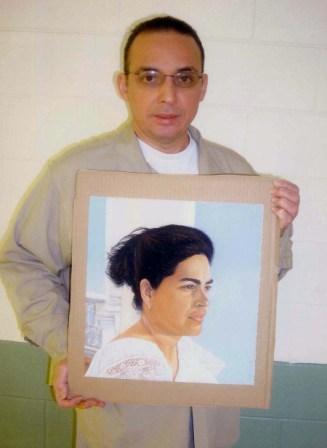
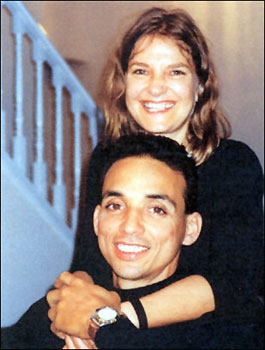
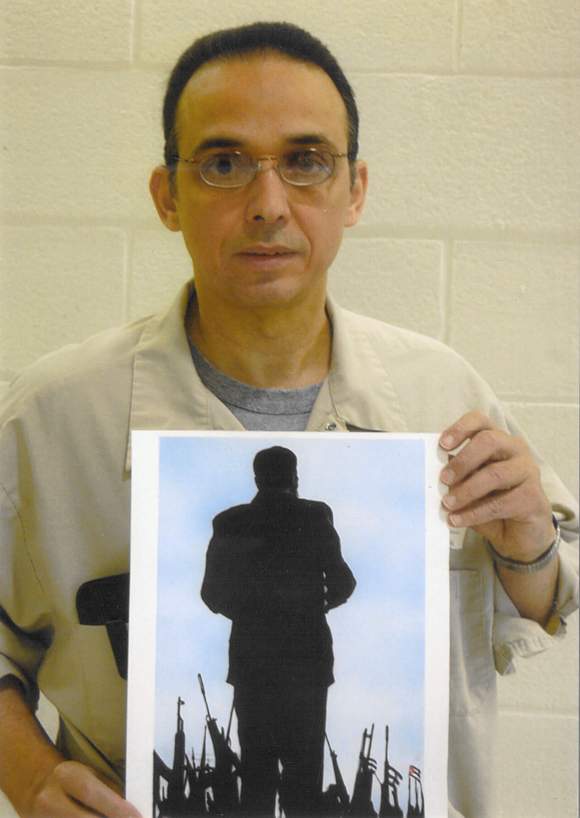
ENCORE: Cuban Five Update: The Re-sentencing of Antonio Guerrero
Earlier this month, Federal Judge Joan A Lenardo replaced the life sentence for Antonio Guerrero, one of the Cuban Five. Mr. Guerrero, a United States citizen, was convicted of spying for Cuba while working at the Naval Air Station in Key West. His sentence was reduced to almost 22 years, which means he could be out of prison in nearly seven years. Mr Guerrero’s attorneys had asked for the sentence to be reduced to 240 months, but Judge Lenardo set it at 262 months.
Mr. Guerrero’s lawyer, Len Weinglass told the New York Times, it was an odd decision, he said “You have a man who was on a military base but who didn’t take a single classified document and no one testified that he injured U.S. national security, but the judge still rejects the prosecutors’ request to lighten the sentence.” Transcript of Hearing
Len Weinglass:
- Antonio Guerrero who I represent, was originally sentenced to life in prison.
- The appellate courts reduced the life sentence for the conspiracy to commit espionage against 3 of the Cuban Five
- The decision only remanded life sentences for ultimately 2 of the Cuban Five including Antonio Guerrero
- We returned to Miami for the re-sentencing on October 13. Prior to the re-sentencing, we negotiated with the government on the issue of re-sentencing alone, making it clear there was no admission of guilt on the underlying charge, which we are still contesting on a later collateral attack.
- We agreed that it should come down from a life sentence to a period of 20 years.
- In Miami, the judge took the very unusual step of setting the agreement aside, and set the term to 21 years and 10 months.
- You can’t give a life sentence ( in this case) on what they intended to get, you can only give a life sentence on top secret information they did get. So, the original life sentence was wrong.
- When we got into the re-sentencing hearing, she got back to her original position as if the appellate court hadn’t ruled.
- I got very upset, the courtroom was packed. Packed with the same old crowd. The crowd in Miami that backs these para-miltary forces, they put the widows up front.
- I got upset at what I sought to be a climate that was being generated in that hearing and so I reminded the judge very forcibly that she was sentencing an individual not a country.
- I had given the court government documents from the Bureau of Prisons, all of them saying that Antonio Guerrero who was serving a faulty life sentence, and sent to a maxium security prison, which he shouldn’t have been sent, because the sentence was wrong.
- But the warden, his counselor and the supervisor of the unit, all extolled his behavior and most significantly pointed out that he had helped save a number of inmates all of whom were doing life sentences, from an encouragable future, by training them in English and Math and overseeing them getting their GED.
- At that time, she was about to pronounce sentence, then she stopped, walked off the bench.
- When the judge came back, the first thing she did is recite a Supreme Court decision, all federal judges must sentence an individual according to his character.
- Antonio was 39 when he was arrested and he will be nearly 60 when he is released. That’s the heart of a lifetime.
- There was no acknowledgment of context here. That this was provoked by a pattern of violence by the US directed at Cuba. Where more than 3000 people have died in the past 40 years from violence coming from Southern Florida.
- The Cuban Five performed their task, nobody was harmed, no property damaged and they end up with life sentences for that operation.
- It came to light that the federal government was paying members of the press in Miami as part of their anti-Castro campaign to write articles about this case that were highly prejudicial. People who were reporters but were on the federal payroll.
- Can the government be responsible for creating a prejudicial atmosphere?
- He was at the most hard-nosed prison and after seven years the warden of that prison wrote the Regional Bureau of Prisons, asking that Antonio be released from that prison. He doesn’t belong, there, he is a lovely sensitive man.
Guest – Attorney Len Weinglass, who represented the Cuban Five, as William Kunstler’s younger partner, Len Weinglass was considered the work horse of the defense team. He’s worked on a number of political cases including the Pentagon Papers trial and the Angela Davis case. He’s a Yale Law School graduate and former U.S. Air Force Captain.
—–
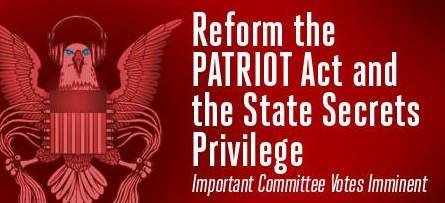

Will The Sun Set On Surveillance? Patriot Act Reform
Recently, the House of Representatives introduced their own USA Patriot Act reform bill, responding to the Patriot Act renewal bill approved by tthe Senate Judiciary Committee. The Electronic Frontier Foundation says it’s a significant improvement over the earlier Senate bill that gave more authority to government spying power. The renewal bill was introduced by House Judiciary Committee Chairman John Conyers, Jr. and others including Civil Liberties Subcommittee Chairman Jerrold Nadler; and Crime, Terrorism, and Homeland Security Subcommittee Chairman Bobby Scott. These bills are proposals that could pave the way to dismantle the broad surveillance and overreaching executive power currently intact.
Kevin Bankston:
- Patriot passed after 9/11/2001 – a lot of the provisions were set to expire in 2005, most of those were renewed, but there were 3 provisions left to expire in the end of 2009.
- Provisions that expanded the government’s power to get orders from the Foreign Intelligence Surveillance Court or any tangible thing, mostly business records. They’re mostly called section 215 orders, under the Patriot Act section 215.
- Roving wiretaps, more accurately roving “john doe” wiretaps. One that doesn’t name target, or address of target. (These sound the like the warrants our founders rebeled against)
- Lone Wolf authority, whereby the government can get wiretapping authorities from the FISA court for people who are unrelated to any foreign power but are suspect to engage in or preparing to engage in crimes related to terrorism.
- The Lone Wolf authority begins to un-moor from the Foreign Intelligence Surveillance Court – it looks to be unconstitutional under the fourth amendment. Most in Obama Administration want this to expire.
- Those are the 3 set to expire. Though worrisome, more worrisome is the National Security Letter Authority, whereby the FBI can write a letter to the court, without suspicion of terrorism, and get bank, telephone and internet records.
- The Justice Act – Senator Feingold / Durman – reform patriot act authorities- including FISA surveillance act passed last summer, which allows foreign surveillance of Americans.
- Also, repealing telecom immunity – Reforming the Patriot Act without addressing FISA is like rearranging deck chairs on the Titanic.
- Unfortunately, Senator Leheay, instead of sponsoring Feingold’s Justice Act reform bill, came out with his own bill that didn’t address the FISA amendment acts at all. That was the bill the Judiciary Committee considered 6 weeks ago.
- The Republicans offered to remove reforms to the already watered down bill, and the Republicans say they got their reforms from the Obama Administration. The Obama Administration is not only falling down on its promise to reform the Patriot Act, it is working through Republicans to make these bills even worse.
- So that’s when the USA Patriot Act reform bill, responding to the Patriot Act renewal bill approved by the Senate Judiciary Committee was proposed.
- We have 2 lawsuits, the first was brought against AT&T in early 2006 based on news reports and whistle blower evidence based on an AT&T technician info, that the NSA had backdoor access to key domestic communication switches.
- Whereby the NSA was sucking up millions upon millions of communications and then sorting out the stuff they were interesting in.
- If the telecom companies aren’t willing to say “NO” when the government secretly comes to them and asks them to break the law, then all of our privacy is in big trouble.
- We sued AT&T and then Congress passed this Telecom Immunity last summer, and our case along with others were dismissed. If the Repealing of the Telecom Immunity passes, our cases will be revived.
- Obama can end the Telcom Immunity right now, and have Attorney General Holder withdraw the certification on which the immunity is based.
Guest – Kevin Bankston, senior staff attorney specializing in free speech and privacy law, was the Electronic Frontier Foundation’s Equal Justice Works/Bruce J. Ennis Fellow for 2003-05. His fellowship project focused on the impact of post-9/11 anti-terrorism laws and surveillance initiatives on online privacy and free expression. Before joining EFF, Kevin was the Justice William J. Brennan First Amendment Fellow for the American Civil Liberties Union in New York City. At the ACLU, Kevin litigated Internet-related free speech cases, including First Amendment challenges to both the Digital Millennium Copyright Act (Edelman v. N2H2, Inc.) and a federal statute regulating Internet speech in public libraries (American Library Association v. U.S.). Kevin received his J.D. in 2001 from the University of Southern California Law Center, and received his undergraduate degree from the University of Texas in Austin.
——————————————————————————–
Afghanistan War, CIA Sponsored Terror, Civil Liberties, FBI Intrusion, Guantanamo, Habeas Corpus, Human Rights, Surveillance, Targeting Muslims, Torture, Truth to Power
Podcast: Play in new window | Download
Updates:
———
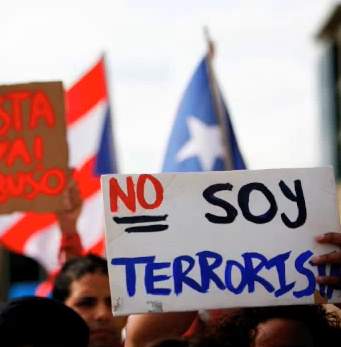

Historic Strike – Privatizing Puerto Rico; Bar Association Dismantled.
Public services grinded to a halt on October 15 in Puerto Rico as a massive one day general strike brought more than 100 thousand people to protest the lay off of about 17 thousand of Puerto Rico’s public employees. The demonstration shut down all state-owned enterprises including the island’s schools and colleges. The airport remained opened, while tens of thousands were reported to converge on San Juan’s Plaza Las Americas.
Main labor organizations, the General Workers Union and the All Puerto Rico for Puerto Rico Coaltion supported the general strike. In May of this year, the Puerto Rican government laid off nearly 8 thousand employees and then hired about 3 thousand temporary teachers and assistants. Union leaders claim that Governor Luis Fortuno is planning to privatize government services. Outrage to the proposed layoffs have rippled into New York City, amid second largest community of Puerto Rican people.
Attorney Judith Berkan:
- Public worker dismissals at almost 25 thousand.
- Any agencies who deal in service to the poor or working class in Puerto Rico
- Two days before the strike, the governor signed and passed a bill aimed at dismantling the Bar Association
- After the massive first strike there have been daily strikes
- They want to return us to the days of the Oligarchy, concentrating wealth into the hands of a few while the remainders pick up the crumbs
- Protesters: Students from every university, every sector of the labor movement, the religious sector, cultural organizations, 700 school principals.
- There were 2000 janitors in the schools, right now there are no janitors in the schools of Puerto Rico and that’s going to be privatized.
- Two thousand school janitors were fired in the middle of the swine flu scare. The government plans to put these jobs out to bid for private companies.
- The atitude is . . . we’re doing this and the rest of you be damned.
- Puerto Rican government: Marcus Rodriguez Ema brought in again whose forte has always been privatization. He said on a radio station that if there was any blockage of commerce that it could be brought under the Patriot Act. He said that they are terrorists and they’re trying to block commerce.
- The way they framed it, if you stop commerce, particularly, the docks and the airports, that would be sanctionable under federal law.
- There have been a number of very offensive comments by the people in charge. Calling community leaders leeches, lowlifes, openly.
- The legislation has cut off funding for the Bar Association in Puerto Rico.
- I think the militancy will continue, we have not seen the last of general strikes here.
Guest – Attorney Judith Berkan, is a partner in the San Juan law firm of Berkan/Mendez. She specializes in government misconduct litigation and employment discrimination cases. Berkan worked as an attorney in New Haven, Connecticut before going to Puerto Rico as the staff attorney for the Puerto Rico Legal Project of the National Lawyers Guild, now the Puerto Rico Civil Rights Institute. For twenty-seven years, she has been teaching, primarily in the Constitutional Law area, at the Inter American University Law School in San Juan, Puerto Rico.
A frequent speaker and author of many articles on civil rights issues, she was the President of the Human Rights Commission of the Puerto Rico Bar Association in the mid-1990’s and a member of the Commonwealth Supreme Court’s task force on gender discrimination.
——–

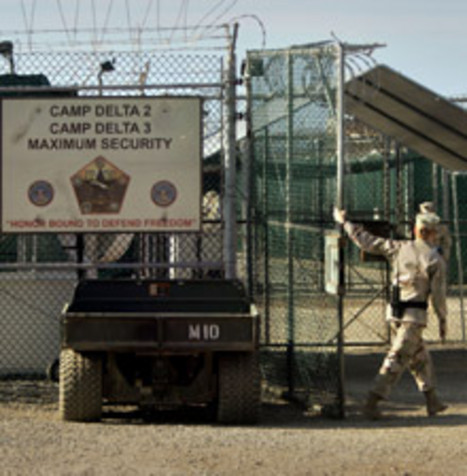
Guantanamo Update: 223 people left in Guantanamo, 97 are Yemeni.
Alla Ali Bin Ahmed was among the 98 remaining Yemeni prisoners let go from Guantanamo Bay prison. In May of this year, a judge reviewed the government’s classified evidence again Ahmed, and ruled that his incarceration had never been justified. Never been justified? Yet, he remained like many Yemenis in Guantanamo Prison. Earlier this year, the Center for Constitutional Rights called for all Yemeni detainees to be released and repatriated. In a media statement, CCR attorney Pardiss Kabriaei, said ” More than one-third of the prisoners at Guantanamo right now are from Yemen. Most have been detained without any charge and in brutal conditions for over six years. It is unacceptable that the Yemeni and U.S. governments have not come to an agreement to bring these men home. There is absolutely nothing which should prevent their return to Yemen.” Law and Disorder March 2009 Interview with Pardiss
Attorney Pardiss Kebriaei:
- This is the part of Guantanamo that is about accountability.
- A case filed in 2008 on behalf of 2 men that died in Guantanamo on June 2006
- We brought this case against 20 officials, including Rumsfeld and Michael Leonard, Jeffrey Miller, people who were in charge of and approved torture techniques.
- U.S. Army General Bantz John Craddock who introduced a policy of force feeding in Guantanamo whereby detainees are literally strapped into chairs that are called restraint chairs, strapped in at five points, while a tube is forced up their nose and down their stomachs and formula is pumped into them for about an hour
- also named are physicans who knew by virtue of reports from the Red Cross.
- Center for Constitutional Rights – When Healers Harm – A focus on the accountability of medical personnel in Guantanamo who have a professional duty and oath to protect the health and well-being of men.
- It took 2 years for the military to conduct its investigation of these suicides.
- We filed Monday Oct 6, a motion to dismiss, they want to get rid of the case essentially, under the point that reporting claims of abuse are barred under the Military Commissions Act of 2006
- There is a provision in it Section 7, we’re challenging the constitutionality of that provision, the provision in the Military Commissions Act of 2006, that prevents detainees to bring lawsuits against the United States, the first time this MCA, has been asserted, now under the Obama Administration.
- Mohammed al Qahtani video tapes documents the torture he was experiencing, forced nudity, prolonged solitary confinement, using dogs and sexual abuse. Those are the methods that were approved by Donald Rumsfeld in 2002
- January deadline to close Guantanamo is not going to be met, according to US Attorney Gen. Holder
- 223 people left in Guantanamo, 97 are Yemeni.
- Federal judges have ruled on some 30 cases, that there is no lawful basis to hold them, yet of 30, 19 remain in Guantanamo. (Kuwaitis / Yemenis)
- Not the worst of the worst left in Guantanamo, it is nationality.
- There are innocent people who have been in prison for 8 years, it’s not a solution to sit back any longer.
- Guantanamo may stay open a few months past January and then transfer prisoners to the US.
Guest – Pardiss Kebriaei, Staff Attorney with the Guantanamo Global Justice Initiative, at the Center For Constitutional Rights.
—————————————————————————










